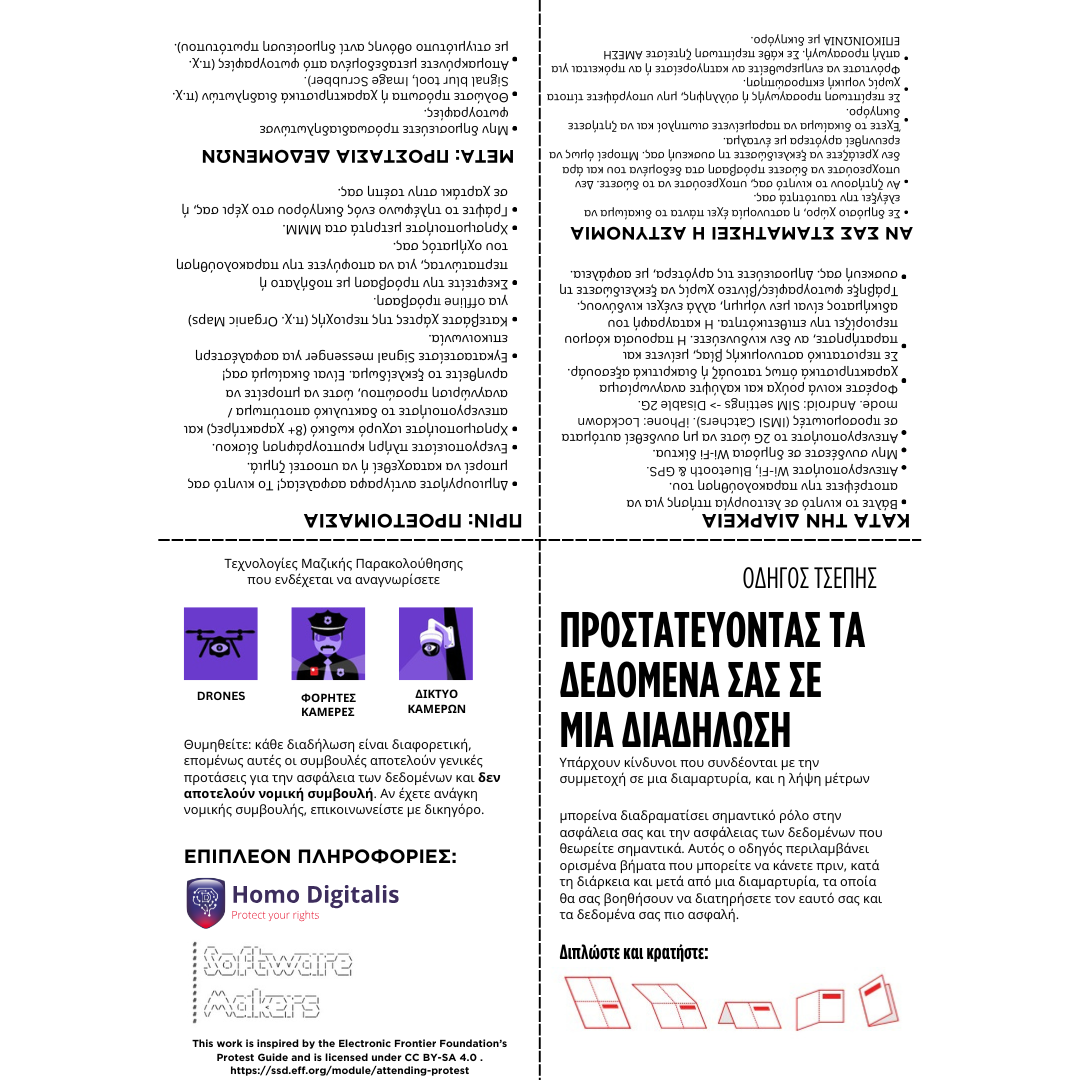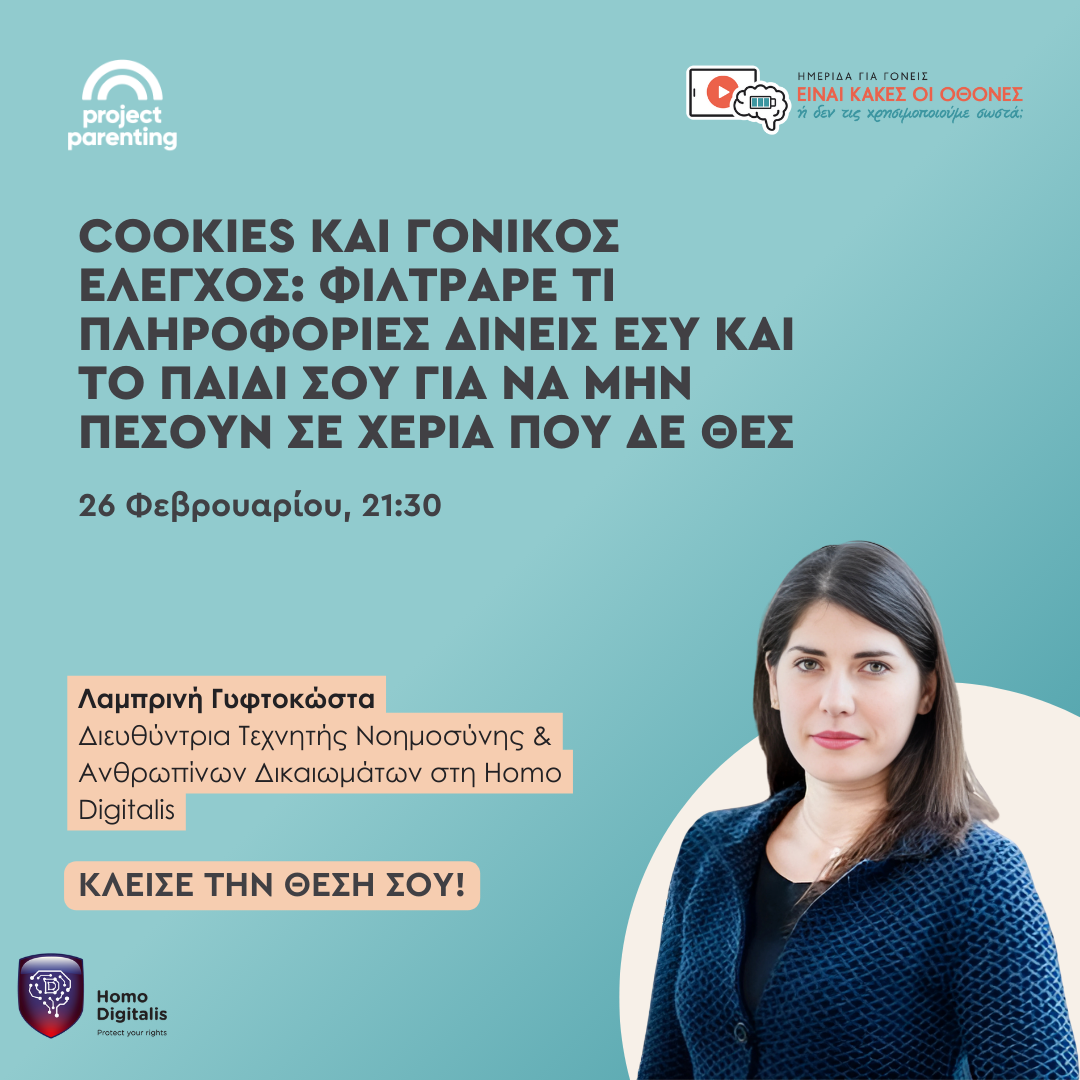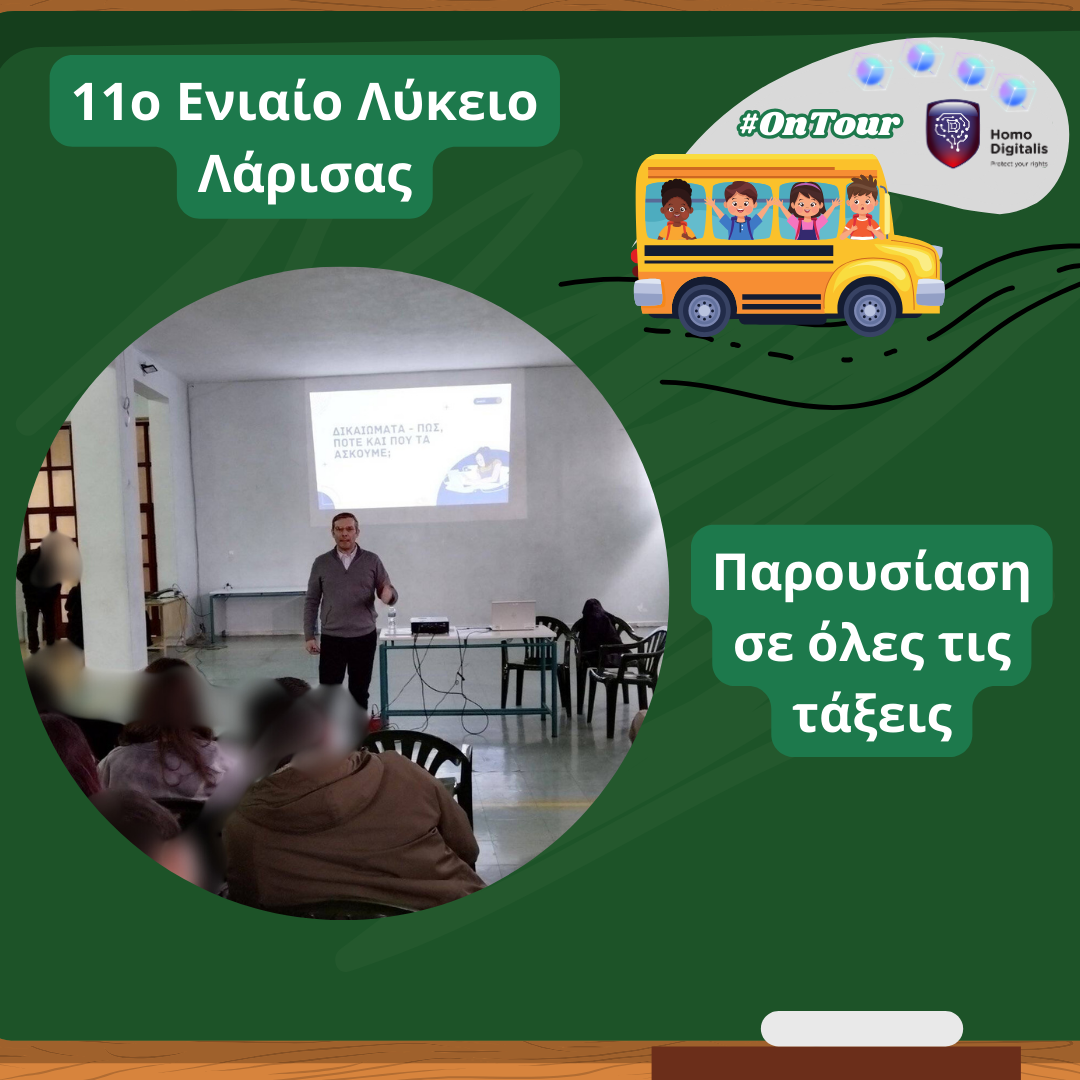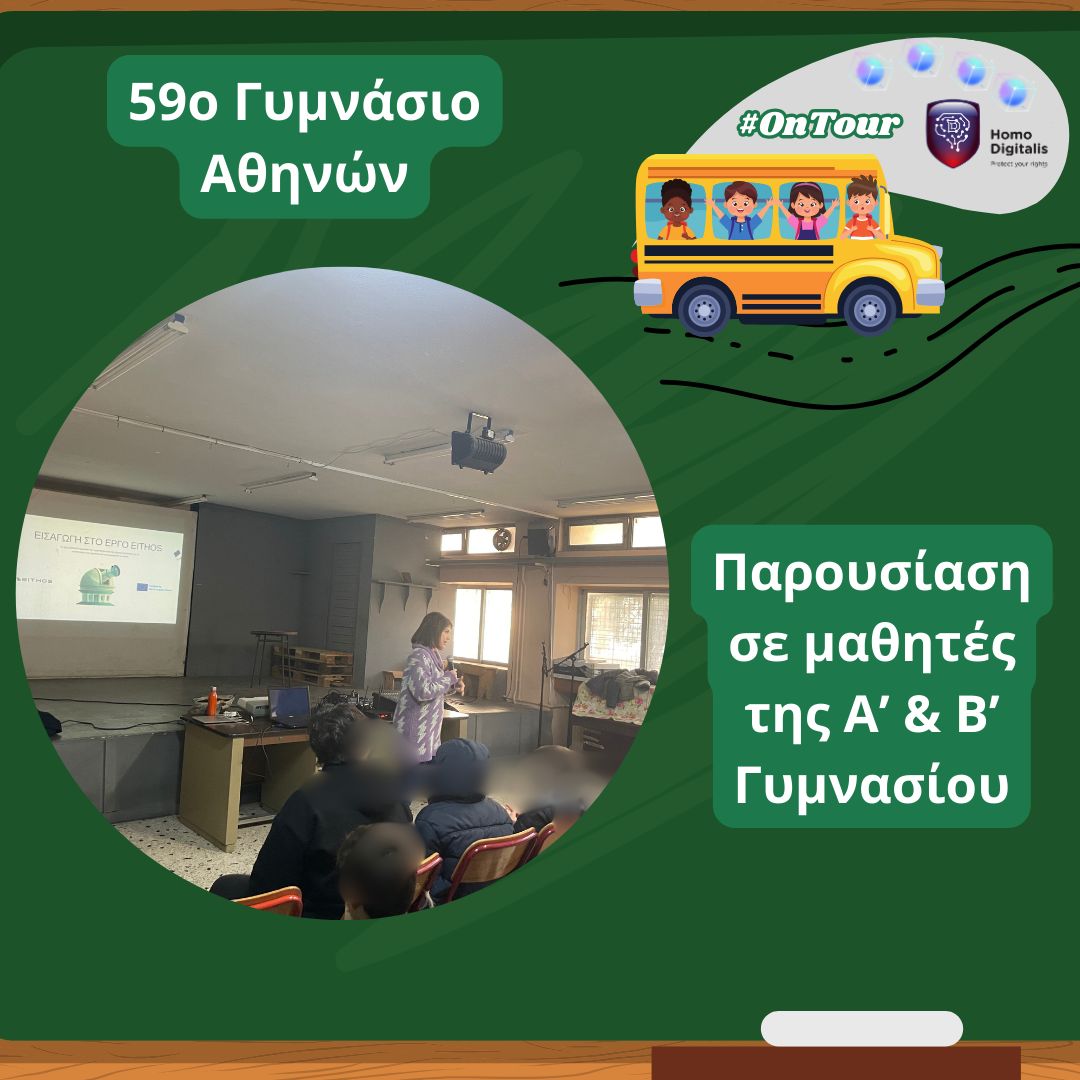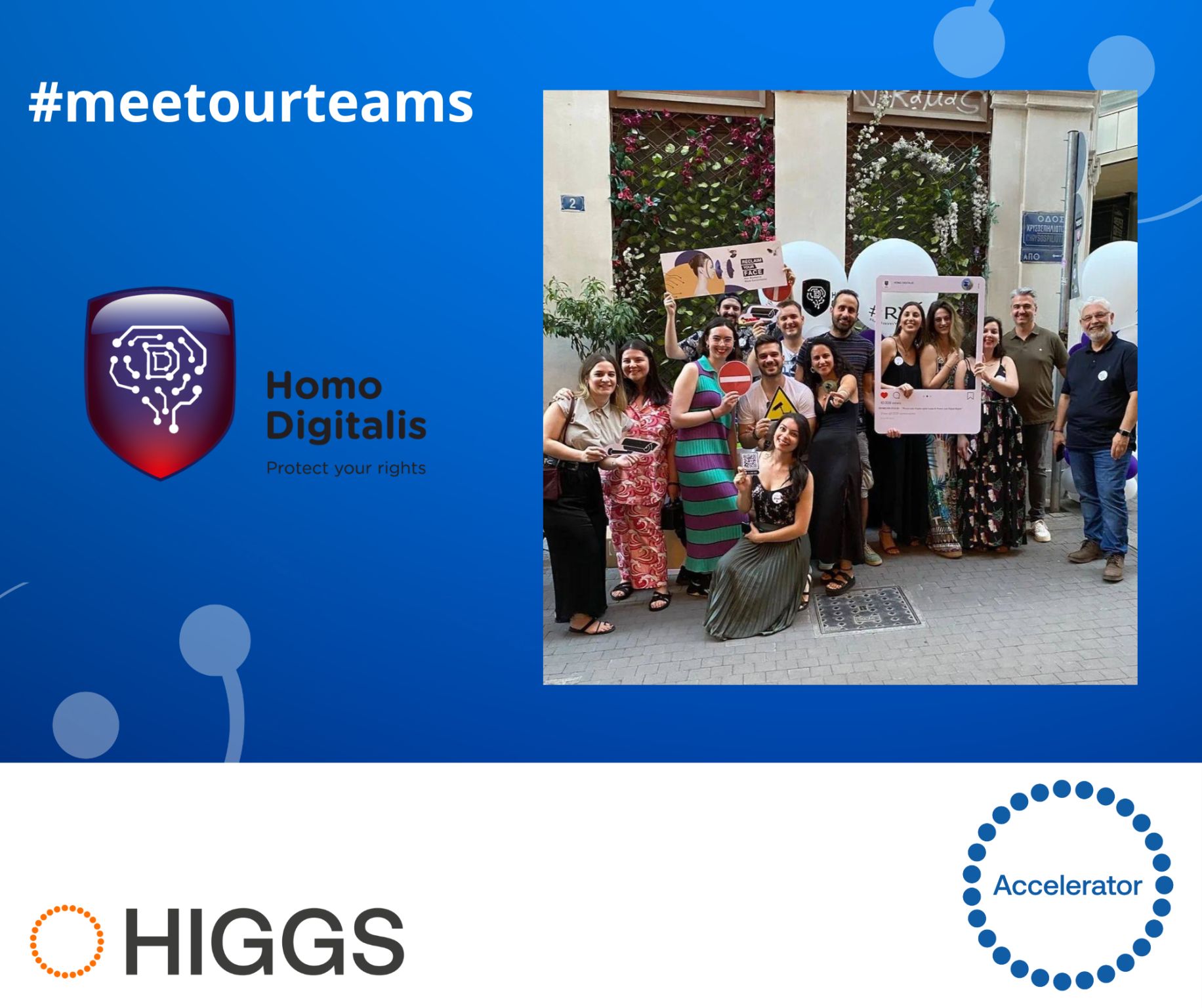Read the Pocket Guide on Protecting Your Privacy During Protests
Today, Friday, February 28, marks two years since the Tempi train tragedy. Strikes and work stoppages have been organized across Greece and abroad to honor the memory of the 57 victims, demand justice, and hold those responsible accountable.
But what about your devices and personal data? How can you take steps to protect them during a protest?
Homo Digitalis, in collaboration with Software Makers, a nonprofit organization based in Heraklion, Crete, has translated and adapted the Electronic Frontier Foundation’s (EFF) Pocket Guide to Greek legal and practical realities. The guide provides essential steps to take before, during, and after a protest to help you safeguard both yourself and your data.
We stand in solidarity and offer our unwavering support!
The guide is available for download and printing here.
Homo Digitalis is participating in the online informational event organized by Project Parenting
Are screens bad, or are we just using them wrong?
Homo Digitalis is honored to participate once again in the digital conference organized by Project Parenting, dedicated to parents. The event takes place today, Wednesday, February 26, from 17:30 to 22:30!
At 21:40, Lamprini Gyftokosta will represent our team, speaking on the topic: “Cookies and Parental Controls: Filter the information you and your child share to keep it from falling into the wrong hands.”
Registrations are free, and you can still sign up to attend a series of insightful talks by experts on various important topics.
We Gave the Most Interesting Interview to the Students of the Nikaias Primary School in Larissa for Data Protection Day
One of the most delightful and wonderful ways we celebrated World Data Protection Day was the online interview given by Lamprini Giftokosta from our team to the fifth-grade class of Nikaias Primary School in Larissa on January 28th! The questions were MANY!!!… ranging from what personal data means, what we are celebrating today, to whether artificial intelligence has a mind, if it knows everything, or if it makes mistakes.
The interview took place as part of a school competition in which the young journalists are participating. We eagerly await the article they will publish and wish them the best of luck!!!
We sincerely thank the educator Vili Karayiorgou and the Nikaias Primary School in Larissa for the flawless cooperation in this initiative.
New Volunteer Awareness Actions - 11th Unified High School of Larissa
Last week, we participated in yet another volunteer-driven awareness action, this time at the 11th Unified High School of Larissa!
There, our member and cybersecurity expert, Tasos Arabatzis, spoke to over 80 students and teachers from all high school grades about the rights we have in the digital space, as part of our educational presentation “Digital Footprint.”
We would like to sincerely thank the school’s principal, Mrs. Evangelia Kremetzi, for the kind invitation and excellent cooperation. We also thank Tasos’ company, Bora – Cybersecurity Marketing, which always gives him the flexibility to represent us in schools and other organizations voluntarily during working hours.
If you are interested in learning more about our pro bono awareness actions in schools, exclusively funded by our own resources, or if you are interested in organizing related actions at your school for the new school year, feel free to send us your messages at info@homodigitalis.gr
New Volunteer Awareness Actions - 59th High School of Athens
Last Thursday, January 23rd, we were at the 59th High School of Athens! There, we spoke for 4 teaching hours to over 200 students and teachers from the 1st and 2nd grade of high school about our digital footprint and cyberbullying! Our Director for Human Rights & Artificial Intelligence issues, Lambrini Gyftokosta, and our co-founder Eleftherios Chelioudakis represented us. The content of our presentations also includes material related to online identity theft, developed by the European research project EITHOS, in which Homo Digitalis participates voluntarily in the Ethics Advisory Board.
We would like to sincerely thank Counselor Mrs. Christina Kalfoglou, the Principal Mr. Katsikas, and the Teacher Mr. Sotiris Manousakis for the invitation and excellent cooperation! A big thank you also to the students for their active participation and trust.
If you are interested in learning more about our pro bono awareness actions in schools, exclusively funded by our own resources, or if you are interested in organizing related actions at your school for the new school year, feel free to send us your messages at info@homodigitalis.gr
Homo Digitalis spoke at the World Economic Forum in Davos, Geneva.
Doing More With Less at Geneva Day in Davos: How to address growing needs in times of economic uncertainty?
We explored this crucial question on Monday 21/1 during a panel discussion held as part of Geneva Day at the House of Switzerland in Davos. We were proud to participate in this event co-organised by Swiss Financial Innovation Desk and the Permanent Mission of Switzerland to the United Nations in Geneva, during the World Economic Forum 2025.
This engaging discussion explored emerging technologies such as Artificial Intelligence (AI), Blockchain, and Central Bank Digital Currencies (CBDCs), combined with innovative fiscal policies, as tools to meet the critical challenges of tomorrow. Our president, Elpida Vamvaka, represented our team speaking about our important actions and victories in the field of AI in Greece, as well as the NGI – The Next Generation Internet NGI TALER project, building a new, privacy-preserving, secure electronic payment system based on open standards, free software, and advanced cryptography.
A heartfelt thank you to the organisers and the distinguished panelists Christoph König, Deputy State Secretary, State Secretariat for International Finance SIF, Kelly T. Clements,, Deputy High Commissioner at UNHCR, the UN Refugee Agency, Daniel Eidan, Advisor & Solution Architect at Bank for International Settlements – BIS Innovation Hub.
The amazing Eva Selamlar-Leuthold, Head of Swiss Financial Innovation Desk (FIND), moderated this particularly dynamic and insightful discussion in a unique manner.
We would also like to extend our warmest thanks to Jonas Pasquier, Head of Global Affairs at the Permanent Mission of Switzerland to the UN in Geneva, his entire team, the Mission, as well as the Presence Switzerland team at the House of Switzerland, for making this event a success.
Would you like to get more insights from this discussion. Stay tuned for an upcoming publication by the Swiss Financial Innovation Desk, here.
New Volunteer Awareness Actions - 7th Technical High School of Larissa
Last Wednesday, January 15th, Homo Digitalis member and cybersecurity expert Anastasios Arabatzis spoke to 100 students of the 7th Technical High School of Larissa about our actions. We would like to sincerely thank the teachers for their kind invitation and the students for their attention. More awareness actions are coming up in Larissa in the coming days! Stay tuned!
We continue our participation in the Accelerator program of HIGGS
We continue our participation in the Accelerator program of HIGGS. The team of Homo Digitalis has been participating in the Accelerator program of HIGGS since October 2024, and now the second cycle of intensive seminars is starting with the aim of training us to improve our organizational structures as well as the management of our operations.
Specifically, the Accelerator program helps us learn, improve, and shape a better strategy for our future. The opportunity to participate in this program gives us access to high-level information that will help us improve the management and actions of Homo Digitalis, as well as the chance to develop a unique network of contacts with other organizations in the public sector and experts in the field!
The President of Homo Digitalis, Elpida Vamvaka, is Invited to WEF at DAVOS: Recognition on a Global Stage
We are thrilled to announce that Homo Digitalis has been invited to participate in an esteemed panel discussion at DAVOS, organized by the Swiss Financial Innovation Desk (FIND) of the State Secretariat for International Finance and the Permanent Mission of Switzerland to the UN in Geneva in the context of the World Economic Forum (WEF).
Event Details:
Topic: Doing More with Less: How to Address Growing Needs in Times of Economic Uncertainty
Date & Time: Tuesday, January 21, 2025 | 17:00-18:30
Location: Crystal Lounge, Davos
Our President, Elpida Vamvaka, will join a distinguished panel of global leaders to discuss how emerging technologies such as Artificial Intelligence (AI), Blockchain, and Central Bank Digital Currencies (CBDCs) can empower governments and organizations to address critical global challenges in times of economic uncertainty. Specifically, in the panel hosting our President, Elpida Vamvaka will be also speaking:
– Christoph König, Deputy State Secretary, State Secretariat for International Finance
– Kelly Clements, United Nations Deputy High Commissioner for Refugees
– Morten Bech, Centre Head Switzerland, Bank for International Settlements (BIS) Innovation Hub
The moderator of the panel will be Eva Selamlar, Head of Swiss Financial Innovation Desk (FIND)
While we celebrate this global recognition, it underscores the need for similar trust and acknowledgment at the national level in Greece. Strengthening Greece’s commitment to technological innovation and policy foresight will pave the way for meaningful change.
You can find more details about the event here.
Let’s make human rights-oriented innovation the cornerstone of a brighter and more resilient future – for Greece and the world.
